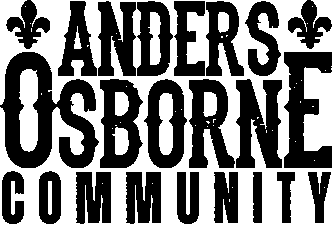Become a community member and get access to exclusive perks.
Free and All Access Memberships available.
Join Community
Become a community member and get access to exclusive perks. Cancel any time.
YaYa Room
$9.99
Monthly
Basic Membership
As a free member, you get notifications whenever Anders Osborne goes live on Volume.
Perks & Benefits
-
Volume Newsletter emails when I have updates and announcements
-
Notifications whenever I go live
All Access - YaYa Room
Every month, members will have access to these exclusive perks listed below!
Perks & Benefits
-
Exclusive Monthly Livestreams
-
Presale Ticket Access
-
Archived YaYa Room Recordings
-
10% Off Merch
About Anders Osborne

Welcome to The Anders Osborne's Community on VOLUME.COM!
Every month, members can look forward to Exclusive Livestreams, Presale Ticket Access, Archived Recordings, and more!






